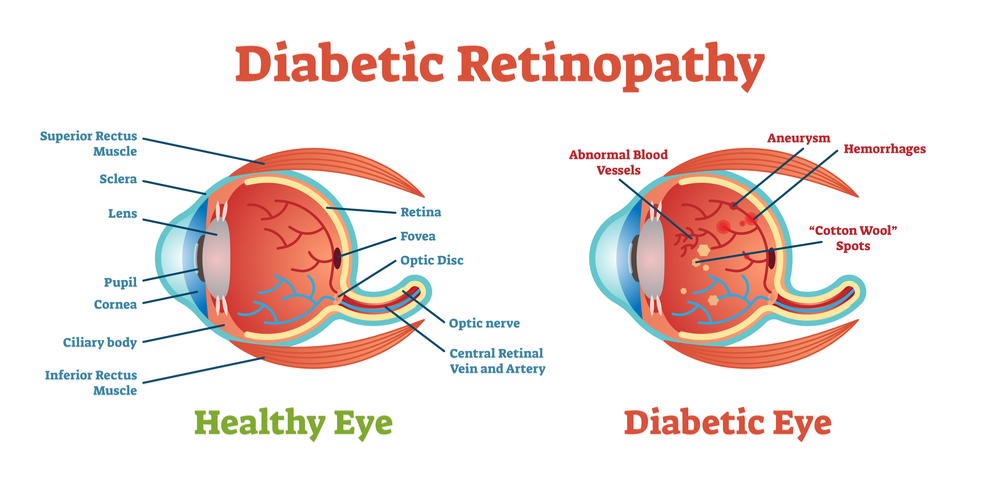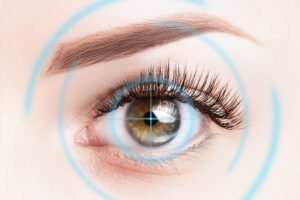
More than 30 million adults in the United States are living with diabetes, that’s nearly 10% of the population. Individuals with diabetes are unable to produce or use insulin, which is a hormone that allows the body to turn sugars into energy.
The most common thought associated with diabetes is high blood sugar, however, diabetes cause many more symptoms and side effects that can be life-threatening if untreated or unmonitored.
Despite the serious complications that come from diabetes, most individuals are able to control the illness and live healthy lives. Catching the early signs of diabetes or prediabetes is important because the side effects of high blood sugar can be severe. One, often forgotten condition of high blood sugar due to diabetes is eye problems, with the most common being diabetic macular edema (DME).
What is DME?
Diabetic macular edema is a serious condition, and if left untreated, can cause loss of vision. Catching this condition early is key to preventing the risk of long-term damage.
Diabetic macular edema is caused by weakened blood vessels in the eye. High blood sugar from diabetes is the main cause of these weakened blood vessels, and the result is that they leak or grow out of control in the retina of the eye; called diabetic retinopathy.
When the blood vessels leak and fluid enters the retina, this is called diabetic macular edema. Eventually, over time, the retina begins to swell from the increased amount of leaking fluid, which puts stress on the macula. The macula is a yellowish oval near the center of the retina, that is responsible for the keenest part of our vision.
There are two types of diabetic macular edema’s, focal and diffuse. Focal DME’s occur because of abnormalities in the blood vessels in the eyes, and diffuse DME’s are a result of the widening or swelling of the retinal capillaries.
Diabetic Macular Edema Symptoms
The scary part, other than the loss of vision, is that sometimes DME’s do not present any symptoms until it’s too late. Diabetic macular edema symptoms are:
- Images directly in front and close appear blurry or wavy
- “Washed out” colors in vision
- Double vision
- Floaters
- Partial or full blindness (if left untreated)

Diabetic Macular Edema Treatment
Getting an early and proper diagnosis is crucial for treating and preventing the serious consequences of DME’s. Along with questions asked by your eye doctor regarding your vision, health, and diabetes condition, a thorough eye exam will be conducted along with one or both of the following tests:
- Fluorescein angiogram (FA) – this imaging procedure takes pictures of your retina with the purpose of finding the leaking blood vessels. This is done by injecting a special dye into the arm that quickly travels to the eye. The dye is visible in the images and will be seen leaking.
- Optical coherence tomography (OCT) – this special camera takes extremely detailed images of the retina, that can identify even minuscule amounts of fluid and swelling.
Treating DME’s is often done through a couple different methods. Sometimes it is cured using drugs that are injected into the eye, that help stop the leaking and prevent the growth of new blood vessels. In more severe cases, patients undergo laser photocoagulation, in which a laser is used to seal the leaking blood vessels.
Taking care of your overall health, as well as your vision, is of great significance. There are several conditions and diseases that can impact your vision, and it is important to see your eye doctor regularly, to discuss your overall health.
At Diamond Vision, we believe in providing our patients with the very best treatments and procedures available, in order to help improve their vision as much as possible. If you’re noticing issues with your vision, be sure to see your eye doctor right away, to rule out serious complications, and come see us if it is only vision imperfections.
Call us today at (888)678-4341 for a free consultation or contact our Atlanta Eye Treatment Center!
Contact Us
If you have more questions about LASIK procedures, get in touch with us.
Related Blogs

Timing is Everything: When to Consider LASIK After Nursing for Optimal Results
Timing is everything when considering LASIK eye surgery after nursing, and understanding the optimal period for this procedure is vital for both mother and baby.

Cataract Surgery: Restoring Clarity and Confidence
Cataract surgery is a transformative procedure that offers a new lease on clear vision and renewed confidence. As cataracts cloud the eye’s lens, causing blurred

Intralase LASIK Explained: What to Expect Before, During, and After the Procedure
Intralase LASIK is a cutting-edge procedure that offers a safe, effective, and precise way to enhance vision compared to traditional LASIK methods. Understanding what to
